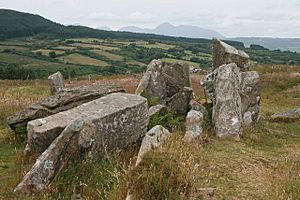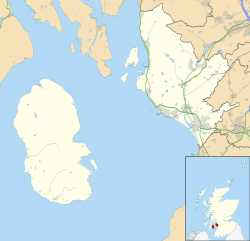Giants' Graves, Arran facts for kids

Giant's Grave North
|
|
| Location | Isle of Arran |
|---|---|
| Coordinates | 55°28′35″N 5°05′50″W / 55.476416°N 5.09732°W |
| Type | Chambered burial tomb |
| History | |
| Periods | Neolithic |
| Site notes | |
| Public access | Yes |
The Giants' Graves are two very old burial places found on the Isle of Arran in Scotland. They are called "chambered tombs" because they have special rooms or chambers inside. These tombs were built a very long time ago during the Neolithic period, also known as the New Stone Age. This was a time when people first started farming and building large stone structures.
The two tombs are quite close to each other, only about 40 metres apart. They sit on a ridge, which is like a long, narrow hill, about 120 metres above the sea. From their spot in a forest clearing, they look out over Whiting Bay to the south.
Contents
Exploring the Northern Tomb
The northern tomb is known as Giant's Grave North. It was originally a large pile of stones, called a cairn, that covered the burial chamber. Over many years, some of these stones have been taken away, but you can still see where the edges of the cairn were.
The main part of this tomb runs from north to south. The northern end is wider and has a curved front, like a welcoming entrance. The burial chamber inside is about 6 metres long and 1 metre wide.
What Archaeologists Found
In 1902, archaeologists carefully dug up parts of this tomb. This process is called an excavation. They found many interesting things that tell us about the people who lived there long ago. These included pieces of pottery, sharp knives made from flint stone, and arrowheads shaped like leaves. These items help us understand how people lived and what tools they used during the Neolithic period.
Discovering the Southern Tomb
The other tomb is called Giant's Grave South. It is built at a right angle to the northern tomb, meaning it forms an 'L' shape with it. The main part of this tomb runs from east to west, and its entrance was on the west side.
The burial chamber inside this southern tomb is about 4 metres long and a little over 1 metre wide.
Findings from the Southern Tomb
When archaeologists first excavated this tomb in 1902, they mostly found soil and stones. However, more digging in 1961 and 1962 uncovered more exciting clues. They found nine pieces of a round-bottomed pot. They also discovered small pieces of burnt bone. These bone fragments suggest that people might have been cremated, or their bodies burned, before being placed in the tomb. These discoveries give us more information about the burial customs of the people who built the Giants' Graves.


